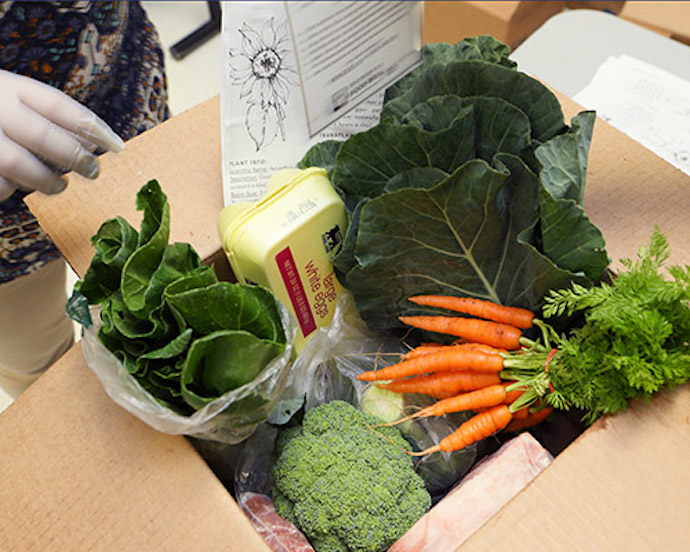Blue Ridge Area Food Bank Partners with Augusta Health

Date: May 26, 2021
Categories: Press Release

VERONA, Va., (May 20, 2021)—The Blue Ridge Area Food Bank is helping Augusta Health prescribe nutritious, wholesome food for patients living with diabetes. Through a new on-site food pantry, eligible patients at Augusta Health’s Center for Diabetes & Endocrinology who need food assistance now have access to nutritious foods that can help them better manage their health condition.
“Patients who receive a referral to the program will soon be able to walk down the hall from their doctor’s or diabetes educator’s appointment to the café window to ‘fill their prescription’,” says Maria Bowman, MPH, programs manager for the Food Bank. “We know that individuals who experience nutrition-insecurity are at a greater risk for developing food-related illnesses such as hypertension, diabetes, and heart disease, compared to their nutrition-secure counterparts. We’re thrilled to provide patients with nutritious foods tailored to their health needs within the trusted and convenient healthcare setting,” she adds.
The Augusta Health Food Pantry partnership marks the growth of Blue Ridge Area Food Bank’s Food Pharmacy nutrition program aimed at helping patients with chronic, food-related illnesses afford the groceries they need. The new pantry supplements shelf-stable items from the Food Bank with the produce the hospital grows on their Allegheny Mountain Institute (AMI) Farm at Augusta Health.
“An onsite food pantry was a strategic priority of Augusta Health’s Community Health Needs Assessment Implementation Plan in 2021. The goal is to increase access to healthy foods for our community members and patients with chronic diseases, such as diabetes,” says Krystal Moyers, MEd, CHES, Director of Community Outreach at Augusta Health. “The Blue Ridge Area Food Bank was a natural collaborator as their mission is to provide nourishing foods to the community through partnerships,” she adds.
The first delivery of food from the Food Bank contained tuna, shelf-stable milk, mixed vegetables, peanut butter, pinto beans, unsweetened apple sauce, and vegetable soup. Along with the varieties of fresh produce from the AMI Farm at Augusta Health, it is a selection that works for the eating plans prescribed by the Center for Diabetes & Endocrinology’s comprehensive team of nutrition experts.
“Good nutrition is essential for individuals with diabetes,” says Megan Cather, RDN, Diabetes Educator at Augusta Health. “If people eat a good balance of nutritious foods, take their medication as prescribed, and drink plenty of water, it will help their blood sugars stay in healthy target ranges,” she added.
According to Kara McGill-Meeks, MS, RDN, CDCES, also a Diabetes Educator at Augusta Health, patients who have a hard time affording the types of food they need most end up relying on foods that don’t support healthy blood sugar levels.
“The patients in this population need access to healthy foods such as produce and lean proteins in order to keep their blood sugars down and/or lose some weight. When patients are struggling financially, they often have to rely on low-cost, highly processed foods that tend to be high in simple carbohydrates or sugars,” McGill-Meeks says. “Patients often tell me that they have to choose each month between food or their medications, or they have to ration medications to last two months.”
“No patient should have to make this kind of choice,” Bowman says. “We’re hopeful that the in-clinic food pantry will make a long-lasting, positive difference for patients in Augusta Health’s Center for Diabetes & Endocrinology.”
Patients seen in the center have access to a comprehensive nutrition team. In addition to Cather and McGill-Meeks, they include Clinical Nutrition Coordinators Caroline Hackley, MEd, RDN, CDCES, and Kathy Berger, RDN.
Augusta Health will track utilization of their pantry program—seeking to improve their processes based on patient and provider feedback. They also plan to measure the impact the program has on patient health outcomes as the partnership progresses.
For interviews, contact Lisa L. Schwenk, at LSchwenk@AugustaHealth.com, or (540) 245-7329; and Abena Foreman-Trice at aforemantrice@brafb.org or (540) 280-6588.
For Food Bank images and videos, please visit the media resources page for reporters and content creators here: www.brafb.org/media-resources/newsroom/.
About the Blue Ridge Area Food Bank
Founded in 1981 and headquartered in Verona, Va., the Blue Ridge Area Food Bank is proud to mark 40 years of providing nourishing food to our neighbors in need. As the largest organization alleviating hunger in western and central Virginia, the Food Bank serves an average of 122, 406 individuals each month across 25 counties and eight cities through distribution centers in Charlottesville, Lynchburg, Winchester, and Verona. This 40th year is like no other: Together with our network of 203 community partners and 180 program sites, we’re serving record numbers of Virginians during a prolonged pandemic and recession. We pledge to continue innovating and adapting to secure, store, and distribute more food to more individuals, families, children, and seniors in need. The Food Bank is a member of Feeding America, a national food bank association that supports 200 food banks across the United States that in the last year provided 6 billion meals to 42 million people through 60,000 partner pantries each year. For more information, visit www.brafb.org.
About Augusta Health
Augusta Health is an independent, community-owned, not-for-profit hospital whose mission is to promote the health and well-being of its community through access to excellent care. Over the years, Augusta Health has been recognized by many external rating organizations: 100 Top Hospitals in America, HealthGrades’ America’s 50 Best Hospitals, US News and World Report Best Regional Hospital, and most recently Leapfrog Top Hospital 2020. For more information about Augusta Health, its programs or its services, please visit the website, https://www.augustahealth.com.
